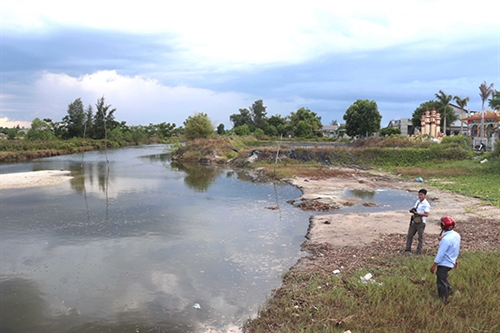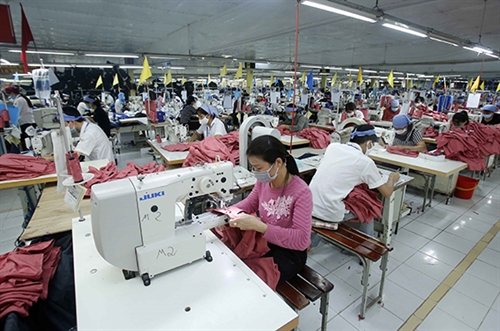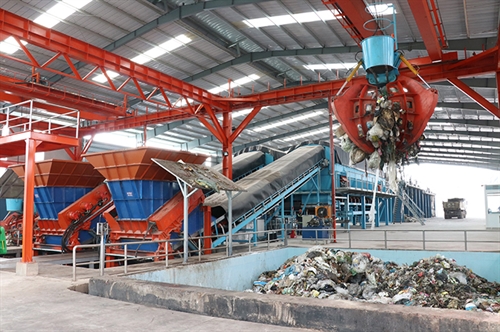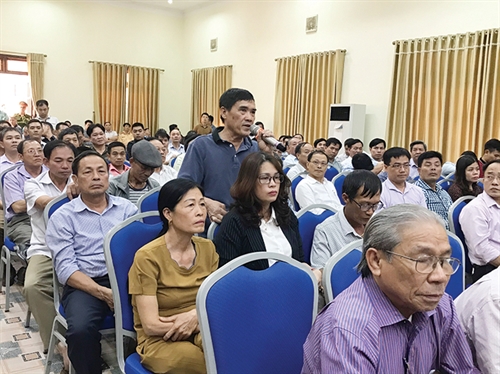Duong Quynh Hoa[1], LL.D.
Institute of State and Law, Vietnam Academy of Social Sciences
To address the growing number of disputes arising from e-commerce transactions over the recent years while traditional methods of at-court dispute resolution become ineffective, the governments of many countries around the world have adopted online dispute resolution mechanisms, including alternative dispute resolution methods (negotiation, mediation and arbitration) and court proceedings using the Internet as a special tool in part or the whole of the dispute resolution process. This article provides an overview of this process in the country and proposes solutions for increasing the application of online dispute resolution methods.
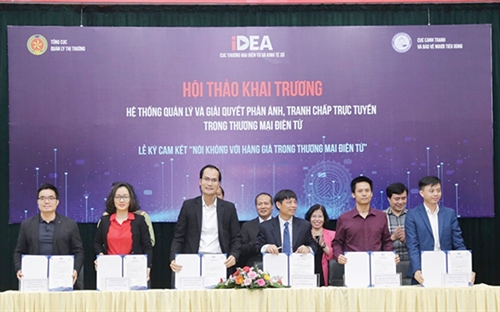 |
| The inauguration ceremony of the system for online complaint and dispute management and resolution in e-commerce in Hanoi on December 18, 2020 Photo: Tran Viet/VNA |
Demand for online dispute resolution in Vietnam
The Internet ushered in a new era of virtual human interactions, including online commercial transactions in the cyber environment. Where offline commercial transactions can lead to problems and disputes, the same is true for online transactions. Before the development of e-commerce on the Internet in mid-1990s, online disputes used to be regarded as a type of social affairs requiring no technology platform to resolve. After that, they have become more complicated and attracted greater attention of the Internet users especially those involved in such disputes. That’s why since the beginning of the 21st century, online dispute resolution (ODR) has become one of the issues of top priority of businesses and governments as well as ODR service providers.
In the global cyber environment, businesses engaged in e-commerce, regardless of their business lines or areas of operation, are usually trapped in conflicts of interest over the right to use high-value domain names. Due to their global scale, the resolution of these conflicts of interest usually involves lengthy and costly legal procedures and therefore requires an ODR system.
In Vietnam, like other countries in the world, the main reason for development of an ODR system is e-commerce, including business-to-business (B2B) and business-to-consumer (B2C) transactions, which has rapidly increased over the last decade following the fast growth of the community of Internet users[2] who enter into e-commerce transactions via the Internet as a common technology platform.
Due to special characteristics of e-commerce that sellers and purchasers do not transact face to face and only make online contacts, scams and frauds (i.e., trading in fake and imitate goods) become more common, leading to the emergence of increasing disputes and claims. The courts can hardly resolve these online disputes and claims by traditional methods for the reason that they are of small value but require high legal costs and it is hard to choose an applicable law (in both cases of e-commerce and consumer interest protection). Therefore, for many years Vietnam has promoted the use of out-of-court alternative dispute resolution (ADR) methods in order to save cost and time and resolve disputes in a more flexible and efficient manner acceptable by all disputing parties. However, in reality, such traditional ADR methods as arbitration, mediation and negotiation have proven not to be advantageous and effective enough.
Unlike other dispute resolution processes, an ODR system is based on ADR methods and court proceedings carried out online beyond physical borders and therefore seems to be swift, efficient, feasible and less expensive. It is particularly suitable to disputes arising from B2C e-transactions as its working mechanism is identical to that of the Internet and facilitates the formulation of resolutions based directly on web platforms and transaction flows[3] and free from imposition by judicial bodies outside the cyber environment where disputes arise. As it has cross-authority and is independent from any codes or regulations, this system is expected to bring about visible benefits for both sellers and purchasers and help remedy damage and access justice on the Internet.
Challenges facing the application of ODR system in Vietnam
Legal framework
Vietnam’s legal framework on e-commerce is fairly adequate but lacks provisions directly regulating ODR, causing difficulties to the application of law to the resolution of e-commerce disputes.
After the Prime Minister approved the overall plan on development of e-commerce in the 2006-10 period on September 15, 2005, the legal framework on e-commerce has been constantly revised and improved. Particularly, the 2005 Law on E-Transactions provides basic legal grounds for e-transactions by recognizing the legality of data messages and providing for digital signatures. The 2006 Law on Information Technology generally stipulates the application and development of information technology, and rights and obligations of persons and entities engaged in the application and development of information technology. Meanwhile, the 2010 Law on Consumer Interest Protection specifies the resolution of disputes for consumers of all categories, including online goods purchasers, and specifies procedures for resolution of disputes between consumers and goods sellers or service providers[4].
However, besides some scattered provisions on general principles of ODR methods in the 2005 Law on E-Transactions and Decree 52 of 2013 regarding e-commerce which cannot be applied directly to effect ODR in practice, the country has not yet enacted a separate legal document providing legal grounds for ODR. The 2015 Civil Procedure Code either has no specific provision on the competence and procedures for resolving e-commerce disputes.
Decree 22 of 2017 on commercial mediation is among just a few documents providing for online dispute mediation, thus initially facilitating the formation of an ODR system. However, its provisions on disputes eligible for ODR, and procedures for making and legal effect of dispute resolution decisions remain unspecific.
Reality shows that infrastructure facilities and network connections for ODR in the country remain poor, somehow limiting the disputing parties’ presentation of their arguments and opinions and interactions among them during court hearings.
Due to the lack of a general ODR mechanism, to date e-commerce service providers have the entire right to decide on how online disputes are resolved by setting out dispute resolution clauses on their websites or applications. Competent agencies do neither control nor challenge the legality of these clauses. As a result, dispute resolution is regarded as private affairs between the disputing parties and the role of e-commerce service providers merely as resolution supporters or mediators might lead to the fact that legitimate interests of consumers in the disputes are ignored.
Technological infrastructure for ODR
In any country, success of ODR depends, to some extent, on technical and technological development to prove its helpful advantages. In Vietnam, the Ministry of Industry and Trade has launched a portal only for consumers to report and complain about trade frauds. However, this portal is not user-friendly and requires cumbersome procedures for information processing. The Vietnam E-Commerce and Digital Economy Agency (iDEA) has also set up a system for management and settlement of online complaints and disputes based on connection and sharing of data with the Vietnam Competition and Consumer Authority (VCCA) and provincial-level Departments of Industry and Trade. This system covers the participation of dozens of e-commerce exchanges and retail chains and receives consumers’ reports on fake, imitate and inferior-quality goods and then forwards them to competent agencies for processing and timely prevention or resolution of disputes.
However, at present, nearly one-third of businesses in Vietnam still lack personnel with adequate knowledge about e-commerce and information and communication technology (ICT) skills. This shows unpreparedness of domestic businesses to apply ODR mechanism which appears to be the biggest challenge in addition to other technical infrastructure matters.
Solutions to step up the application of ODR mechanism in Vietnam
From the above analyses, the author recommends some solutions to facilitate practical implementation of ODR mechanism in the country.
Firstly, the State should step up the creation and improvement of an e-government, especially with regard to the judicial system, in order to resolve people’s disputes, denunciations and complaints about frauds and theft committed on the Internet and other cybercrimes or forward them to state management agencies for timely investigation and handling. Courts, procuracies and other units that receive complaints and denunciations would be required to run their professional operations on the Internet and ensure this system’s convenience for people to access justice.
Secondly, Government Decree 52 of 2013 should be revised through adding specific provisions on the list of e-commerce websites and detailed instructions on process of entering into online purchase and sale contracts.
Thirdly, legal documents on methods and process of collecting e-evidences and rights of collectors should be revised. At the same time, it is a need to build a system for citizen e-identification and speed up the development of a national database on population and facilitation of issuance of citizen e-identity cards bearing e-signatures[5].
Fourthly, the Supreme People’s Court needs to provide detailed guidance on application of e-signatures in court proceedings as well as delivery and receipt of procedural documents.
Fifthly, there should be regulations compelling e-commerce businesses to establish connections with ODR service providers for resolving disputes arising on their e-commerce exchanges.
Last but not least, investment should be made in technological infrastructure facilities used to ensure uninterrupted transmission of data, audiovisual contents and interactions during online hearings over e-commerce disputes. Also, arbitrators, judges, lawyers, and litigants should get used to online technologies.-
